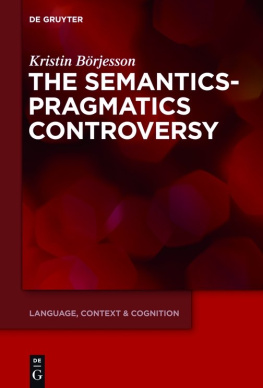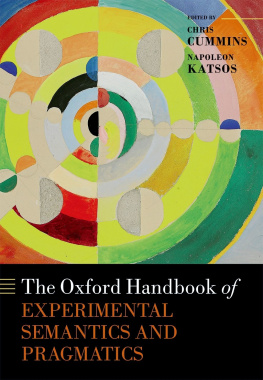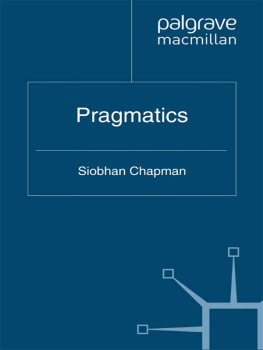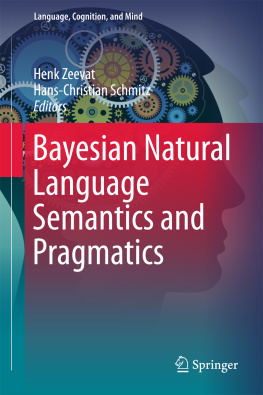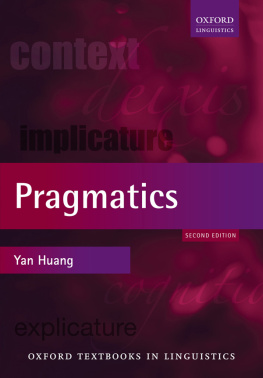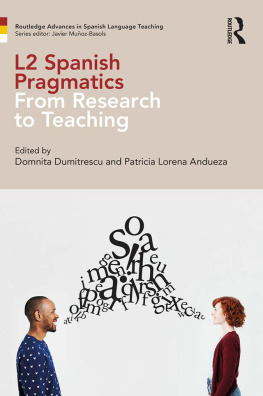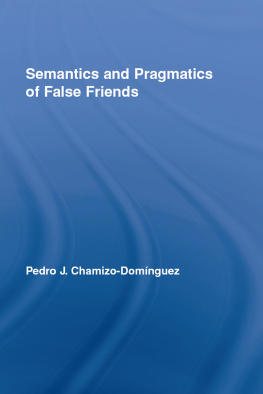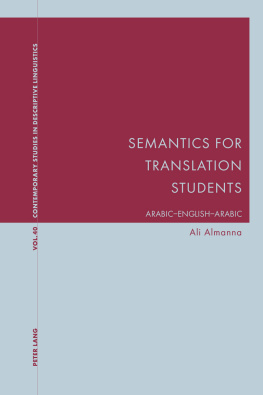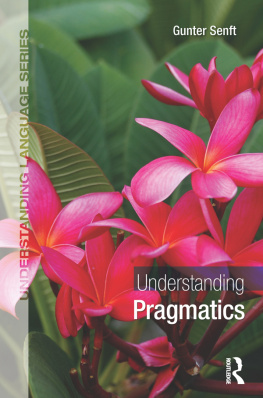Börjesson - The Semantics-Pragmatics Controversy
Here you can read online Börjesson - The Semantics-Pragmatics Controversy full text of the book (entire story) in english for free. Download pdf and epub, get meaning, cover and reviews about this ebook. City: Berlin, year: 2014, publisher: De Gruyter, genre: Romance novel. Description of the work, (preface) as well as reviews are available. Best literature library LitArk.com created for fans of good reading and offers a wide selection of genres:
Romance novel
Science fiction
Adventure
Detective
Science
History
Home and family
Prose
Art
Politics
Computer
Non-fiction
Religion
Business
Children
Humor
Choose a favorite category and find really read worthwhile books. Enjoy immersion in the world of imagination, feel the emotions of the characters or learn something new for yourself, make an fascinating discovery.
- Book:The Semantics-Pragmatics Controversy
- Author:
- Publisher:De Gruyter
- Genre:
- Year:2014
- City:Berlin
- Rating:5 / 5
- Favourites:Add to favourites
- Your mark:
- 100
- 1
- 2
- 3
- 4
- 5
The Semantics-Pragmatics Controversy: summary, description and annotation
We offer to read an annotation, description, summary or preface (depends on what the author of the book "The Semantics-Pragmatics Controversy" wrote himself). If you haven't found the necessary information about the book — write in the comments, we will try to find it.
The Semantics-Pragmatics Controversy — read online for free the complete book (whole text) full work
Below is the text of the book, divided by pages. System saving the place of the last page read, allows you to conveniently read the book "The Semantics-Pragmatics Controversy" online for free, without having to search again every time where you left off. Put a bookmark, and you can go to the page where you finished reading at any time.
Font size:
Interval:
Bookmark:
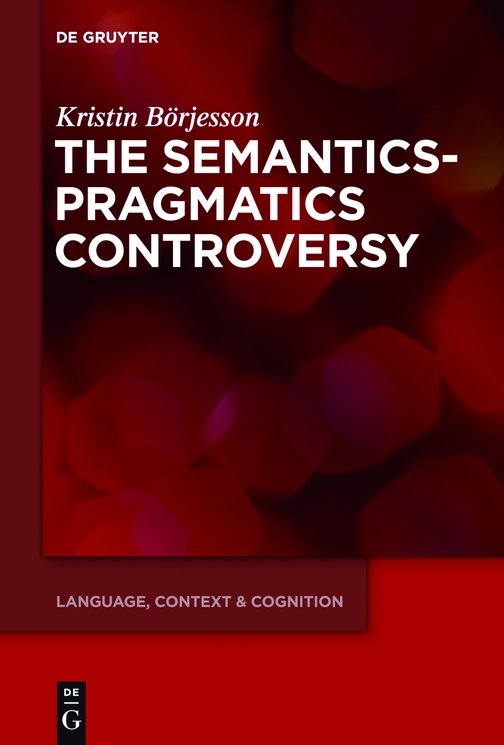
This book grew out of my doctoral thesis, during the writing of which I was supported in different ways by various people that I would like to thank. First of all, my thanks go to Johannes Dlling for suggesting the topic to me and supervising my thesis. I have profited greatly from his assiduous comments and the various suggestions he made. I would also like to thank Anita Steube and Robyn Carston who kindly agreed to act as examiners of the thesis. It was due to Anita Steubes initiative that I was enabled to turn my thesis into the actual book within the Language, Context and Cognition series. I am grateful for that. Robyn Carston provided a range of valuable comments on my thesis, which lead me to review and integrate some more recent (mostly relevance-theoretic) literature on the subjects in question.
I started out working on my thesis in the Graduate School Universality and Diversity: Linguistic Structures and Processes at the University of Leipzig. I would like to thank the people involved in the Graduate School for making the three years I spent there a memorable time, especially my colleagues Christiane Kaden, Antje Lahne, Matthias Irmer, Susann Zschernitz, Sonja Fleischhauer, Barbara Sonnenhauser, Petra Augurzky, Andreas Bulk, Olav Mller-Reichau, Torsten Andreas, Petr Biskup, Helena Trompelt and Stefan Sudhoff.
I continued to develop my thesis while working first at the Institute for German at the TU Braunschweig and later at the Institute for English and American Studies at the FAU Erlangen-Nrnberg. I would like to thank Martin Neef (TU Braunschweig) and Thomas Herbst as well as Brigitta Mittmann (both FAU Erlangen-Nrnberg) for making me feel at home at these two institutions, despite the amount of travelling involved. The final phase of this thesis I was able to concentrate on back in Leipzig, for which possibility I am very much indebted to Gereon Mller.
Finally, I want to thank my mother Christine for the continuous support she gave, not only during the time it took me to write my thesis. Especially the last year, working on the thesis would not have been possible if it had not been for her looking after her (then) youngest grandson. At the risk of sounding trite, last but not least, my thanks go to Christian for supporting me and always keenly providing examples of how literal/non-literal meaning and various types of ambiguity are exploited, especially for humorous purposes.
Allot, N. and Textor, M.: 2012, Lexical Pragmatic Adjustment and the Nature of Ad-hoc Conpcets., International Review of Pragmatics , 185208. URL: http://www.kcl.ac.uk/artshums/depts/philosophy/research/wordmeaning/papers/adhoc.pdf
Ariel, M.: 2002, The demise of a unique concept of literal meaning., Journal of Pragmatics , 361402.
Asher, N. and Lascarides, A.: 2003, Logics of Conversation. , Cambridge: Cambridge University Press.
Assimakopoulos, S.: 2008, Intention, common ground and the availability of semantic content: a relevance-theoretic perspective., in I. Kecskes and J. Mey (eds), Intention, common ground and the egocentric speaker-hearer. , Mouton de Gruyter.
Bach, K.: 1994a, Conversational Impliciture., Mind and Language , 124162.
Bach, K.: 1994b, Semantic slack: what is said and more., in S. L. Tsohatzidis (ed.), Foundations of Speech Act Theory. Philosophical and linguistic perspectives. , Routledge, pp. 267291.
Bach, K.: 1997, The Semantics-Pragmatics Distinction: What It Is and Why It Matters., Linguistische Berichte, Special Issue on Pragmatics , 3350.
Bach, K.: 2000, Quantification, Qualification and Context. A Reply to Stanley and Szab., Mind and Language , 262283.
Bach, K.: 2001a, Speaking Loosely: Sentence Nonliterality., Midwest Studies in Philosophy , 249263. Figurative Language.
Bach, K.: 2001b, You dont say?, Synthese , 1544.
Bach, K.: 2004, Minding the gap., in C. Bianchi (ed.), The Semantics/Pragmatics Distinction. , Stanford: CSLI.
Bach, K.: 2005, Context ex Machina., in G. S. Zoltn (ed.), Semantics vs. Pragmatics. , Oxford: Clarendon, pp. 1544.
Bach, K.: 2006a, Impliciture vs. Explicature: Whats the difference? Paper given at the Workshop on Explicit Communication, University of Granada, Spain. URL: userwww.sfsu.edu/kbach/Bach.ImplExpl.pdf
Bach, K.: 2006b, The Excluded Middle: Semantic Minimalism without Minimal Propositions., Philosophy and Phenomenological Research , 435442.
Bach, K.: 2012, Context dependence (such as it is), in M. Klbel and M. Garcia-Carpintero (eds), The Continuum Companion to the Philosophy of Language. , Continuum, pp. 153184.
Bach, K.: n.d.a, From the strange to the bizarre: Another Reply to Cappelen and Lepore. URL: userwww.sfsu.edu/kbach/reply2toC&L.pdf
Bach, K.: n.d.b, Minimalism for Dummies: A Reply to Cappelen and Lepore. URL: userwww.sfsu.edu/kbach/replytoC&L.pdf
Baker, C., Fillmore, C. and Cronin, B.: 2003, The structure of the FrameNet database., International Journal of Lexicography , 281296.
Baker, C., Fillmore, C. and Lowe, J.: 1998, The Berkeley FrameNet project., Proceedings of the 36th ACL and 17th COLING , San Francisco, pp. 8690.
Barner, D., Brooks, N. and Bale, A.: 2011, Accessing the unsaid: The role of scalar alternatives in childrens pragmatic inference, Cognition , 8493.
Baron-Cohen, S., Leslie, A. M. and Frith, U.: 1985, Does the autistic child have a theory of mind?, Cognition , 3746.
Beretta, A., Fiorentino, R. and Poeppel, D.: 2005, The effects of homonymy and polysemy on lexical access: an MEG study., Cognitive Brain Research , 5765.
Bezuidenhout, A. L.: 2006, The coherence of contextualism., Mind and Language , 110.
Bezuidenhout, A. L. and Cutting, J. C.: 2002, Literal meaning, minimal propositions, and pragmatic processing., Journal of Pragmatics , 433456.
Bezuidenhout, A. L. and Morris, R. K.: 2004, Implicature, Relevance, and Default Pragmatic Inference., in D. Sperber and I. Noveck (eds), Experimental Pragmatics. , Palgrave Macmillan, Basingstoke, pp. 257282.
Bianchi, C. (ed.): 2004, The Semantics/Pragmatics Distinction. , CSLI Publications.
Bierwisch, M.: 1979, Wrtliche Bedeutung - eine pragmatische Gretchenfrage., in G. Grewendorf (ed.), Sprechakttheorie und Semantik. , Frankfurt am Main, Suhrkamp Verlag, pp. 119148.
Bierwisch, M.: 1980, Semantic Structure and Illocutionary Force., Speech act theory and pragmatics. , D. Reidel, Dordrecht.
Bierwisch, M.: 1983, Semantische und konzeptuelle Reprsentation lexikalischer Einheiten., in R. Rika and W. Motsch (eds), Untersuchungen zur Semantik. , Akademie Verlag, Berlin, pp. 6199.
Bierwisch, M.: 1997, Lexical Information from a Minimalist Point of View., in C. Wilder, H. M. Gerlach and M. Bierwisch (eds), The Role of Economy Principles in Linguistic Theory. , Akademie Verlag, Berlin.
Bierwisch, M. and Lang, E. (eds): 1987, Grammatische und konzeptuelle Aspekte von Dimension-sadjektiven. , Akademie-Verlag, Berlin.
Bierwisch, M. and Schreuder, R.: 1992, From concepts to lexical items., Cognition , 2360.
Blasko, D. G. and Connine, C. M.: 1993, Effects of familiarity and aptness in metaphor processing., Journal of Experimental Psychology: Learning, Memory and Cognition , 295308.
Bohrn, I. G., Altmann, U. and Jacobs, A. M.: 2012, Looking at the brains behind figurative language a quantitative meta-analysis of neuroimaging studies on metaphor, idiom, and irony processing., Neuropsychologia , 26692683.
Borer, H.: 2004, Structuring Sense. , Vol. 1 and 2, Oxford: Oxford University Press.
Font size:
Interval:
Bookmark:
Similar books «The Semantics-Pragmatics Controversy»
Look at similar books to The Semantics-Pragmatics Controversy. We have selected literature similar in name and meaning in the hope of providing readers with more options to find new, interesting, not yet read works.
Discussion, reviews of the book The Semantics-Pragmatics Controversy and just readers' own opinions. Leave your comments, write what you think about the work, its meaning or the main characters. Specify what exactly you liked and what you didn't like, and why you think so.

